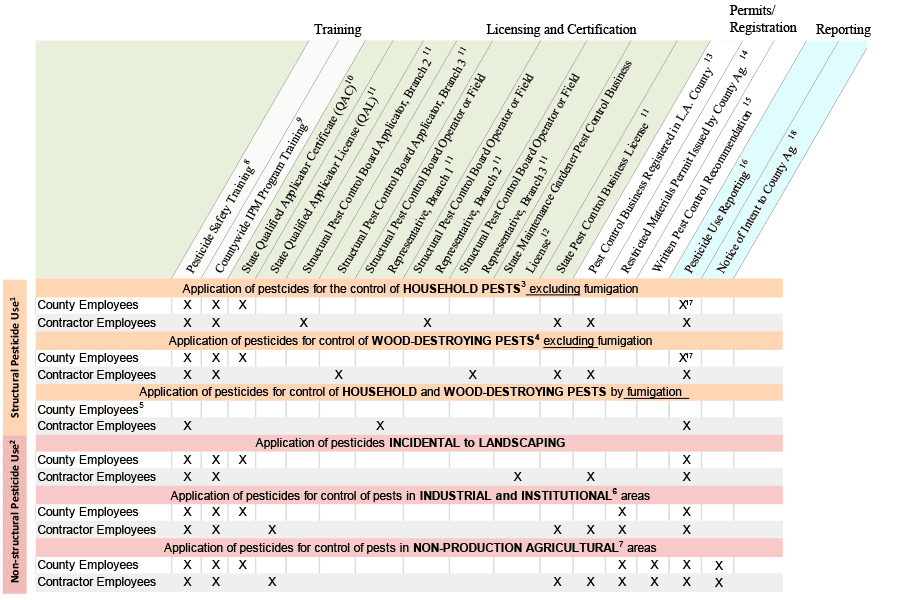A Matrix of Los Angeles County Outdoor Pesticide Use Requirements

- Structural Pesticide Use means pesticides used to control household pests or wood destroying organisms which may invade households or other structures.
- Non-Structural Pesticide Use means virtually any outdoor use of a pesticide
- Household Pests are those pests other than wood destroying pests or organisms, which invade households and other structures, including, but not limited to, rodents, vermin and insects.
- Wood Destroying Pests are insects like termites and other organisms such as fungus that can damage structural wood.
- It is highly unlikely a County employee would perform a fumigation
- Industrial/institutional pesticide use is a type of non-agricultural, outdoor application of a pesticide performed on property necessary for the operation of warehouses, factories and buildings like schools, hospitals and offices. Section 20.0-CONTRACTORS, CONTRACTING AND BUYING PESTICIDES has additional information what constitutes an Industrial/Institutional use of a pesticide.
- Non-production Agricultural pesticide use refers to outdoor applications of pesticides that are not Industrial/Institutional use, and are not for the production for sale of an agricultural commodity. They include: cemeteries, ditches, golf courses, greenbelts, highway medians, irrigation canals, parks, recreation areas, reservoirs, roadsides, rights-of-way and fallow land.
- Any employee who applies a pesticide must be receive training prior to use and then annually thereafter. Appendix B has a list of the topics the training must address. Employee training is not required for employees handling consumer products packaged for distribution to, and use by, the general public provided that the employee use of the product is not significantly greater than the typical consumer use of the product.
- Both County and Contractor employees who apply pesticides and/or perform certain other job duties are expected to have training in the Countywide IPM Program to a level appropriate to their job duties and responsibilities. Section 19.0- PROGRAM TRAINING has additional information on training.
- Any pesticide application performed by a County employee must be done by or under the direct supervision of a State certified Qualified Applicator certified in the appropriate category.
- See Section 20.0 – CONTRACTORS, CONTRACTING and BUYING PESTICIDES
- A contractor must possess a Maintenance Gardener Pest Control Business License if they are a maintenance gardener who occasionally engages in pest control in support of his/her primary gardening business. A contractor is a maintenance gardener if his/her maintenance gardening activities include mowing lawns, performing general yard clean up, and taking care of ornamental and turf plants in:
- Outdoor ornamental and garden areas surrounding public structures, such as buildings, brick walls, fountains, fences, statues;
- Outdoor ornamental and garden areas surrounding commercial parks, such as offices, restaurants, warehouses, factories, stores, shopping centers, malls;
- Parks, golf courses, cemeteries, but only on ornamental or turf plantings near buildings that are distinct and separate from the plantings that constitute open space landscaping in a park, golf course or cemetery itself.
Persons performing pest control incidental to new construction are not required a Maintenance Gardener Pest Control Business License. A list of currently valid Maintenance Gardener Pest Control Business Licenses may be viewed at the DPR website at: www.cdpr.ca.gov/docs/license/mgardener.htm. ACWM can also answer any questions regarding licensing or anything else about safe and legal use of pesticides in Los Angeles County.
- The Pest Control Business must be registered with ACWM to perform work in Los Angeles County.
- Certain pesticides require a Restricted Materials Permit issued by ACWM before they can be used in one of the non-production agricultural use sites listed in Table 3 on page 53. This includes rodenticides with strychnine, zinc phosphide, aluminum phosphide and anticoagulants as active ingredients as well as any herbicide listed by CDPR as having been detected in groundwater. The complete listing of materials requiring a Restricted Materials Permit is found in Section 6400 of the California Code of Regulations.
- Most pesticide applications within one of the non-production agricultural use requires a Written Recommendation prepared by a CDPR certified Pest Control Advisor or designated ACWM staff. See PART 2 – SAFE AND EFFECTIVE USE OF PESTICIDES AND FERTILIZERS.
- Registered structural pest control companies must prepare and submit to ACWM a monthly summary (Report) of all pesticides they have used in Los Angeles County. In addition, any person, including County employees, must submit to ACWM a monthly Report of all pesticides used in one of the non-production agricultural sites listed in Table 3 (Section 14). The Reports are due by the 10th of the following month and pest control businesses are required to submit one even if no pesticides were used during the month (Negative Pesticide Use Report).
Contractors must provide an annual summary of pesticides used directly to the contacting County department on a monthly basis (see Section 20.0) - County employees applying pesticides outdoors must report the use annually to the Los Angeles County, Department of Public Works, Watershed Division.
- Before applying any pesticide requiring a Restricted Materials Permit, applicators must file a NOTICE OF INTENT TO APPLY A RESTRICTED MATERIAL to ACWM at least 24 hours before the scheduled application.

